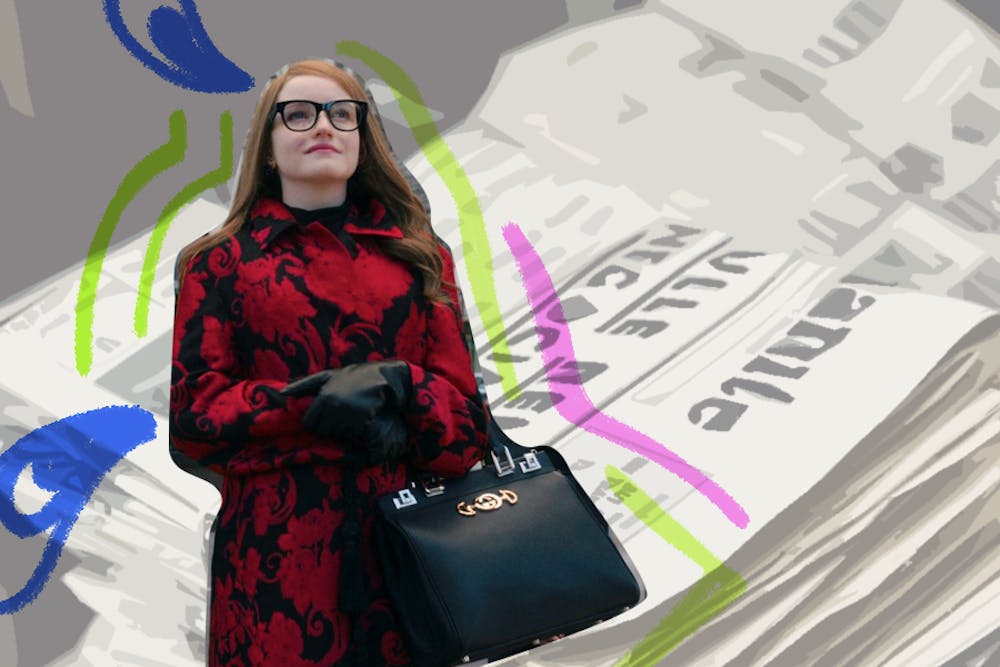Everything you are about to read in this article is completely true, except for all the parts that are totally made up.
Cruising on multi–million dollar yachts as the sun sets over the Mediterranean, jetting all over the world, attending the most exclusive fashion shows and clubs, staying at the most expensive hotels in the world, dining with the most powerful people in New York City, wearing designer clothing only the richest of the rich can afford, and then your alarm goes off. For most, living like this would only be a dream. For Anna Delvey, this was reality.
Netflix’s new miniseries, Inventing Anna, is based on the true story of the Russian–born Anna Sorokin (known by the alias Anna Delvey), who pretended to be a German heiress worth millions, and conned New York’s elite, banks, hotels and even her own “friends” out of hundreds of thousands of dollars between 2013 and 2017. Adapted by Shonda Rhimes’ media company, Shondaland, the show's storyline was inspired by Jessica Pressler’s 2018 article published in New York Magazine’s ‘The Cut’ in which she broke Anna Delvey’s story. Starring Ozark’s Julia Garner, as well as other talented actresses such as Laverne Cox, Anna Chlumsky, and Katie Lowes, Rhimes created yet another hit series centered around a badass woman. It even broke the record for being Netflix’s “most watched English–language series in a one week period.”
The story is told mainly through the journalist Vivian Kent (inspired by Pressler) and her direct interactions with Anna, as well as the stories Kent pulls out of Anna’s former confidants. While the characters in the show are based on real people, each episode is a perfect blend of fact and fiction, making for just the right amount of drama and tension for the television screen. Although this makes for great entertainment, the show has received its fair share of criticism. Rachel Williams, a former writer for Vanity Fair who Anna defrauded, slammed the show for “promoting this whole narrative and celebrating this sociopathic, narcissistic, proven criminal.” She’s worried that because “hunger for this type of entertainment urges media companies to create more of it,” it will “[incentivize] people like Anna and make [crime] seem like a viable career path.”
Every episode starts out by saying, “This whole story is completely true. Except for all the parts that are totally made up,” and part of what makes the show's arc so intriguing is that every person has a different idea of who Anna was during the time in question. It's as if she was constantly reinventing herself. So, who was Anna Delvey? Who is Anna Delvey? No one really knows. Even her accent couldn’t identify her, as it was a blend of Russian and German. She sounded like she came from everywhere and nowhere all at once. All anyone knew, or thought, was that “Anna belonged. She was society.”
In the pilot, Garner’s Delvey is in Rikers Island jail after being arrested for fraud, and agrees to forgo the plea deal offered to her while awaiting trial in order to allow Kent to interview her and release her “real” story to the public. Kent, trying to bounce back from a journalistic scandal of her own, knows that Anna’s story will make waves due to her elusive nature, the people she associated with, and the fact that she almost got away with her crimes. Kent makes it clear to Anna that everyone will think she's “a dumb socialite, a joke,” if she doesn’t let Vivian write her story and publish it in the fictional Manhattan Magazine. Vivian also promises Anna fame, something she longs for.
What is interesting is that Anna’s moral compass is constantly being questioned, and her intentions are unclear. As the series goes on, it's revealed that Anna wasn’t simply trying to scam the rich out of a lot of money for no reason, she was trying to open “The Anna Delvey Foundation,” an exclusive, members–only club focusing on art and opulence. The show’s portrayal of Delvey makes it seem like she was trying to make a name for herself as a woman and beat the odds while smashing the patriarchy. Even though this may have been true, it’s easy to lose sight of the fact that what she did was, in fact, wrong.
The flashbacks we see, the stories we’re told, and the way we’re able to sympathize with Anna on some level brings the viewer to the somewhat unsettling conclusion that they might identify with, or even want to be like her in some ways. She's an interesting character and person because she seems to straddle this moral line, making her complex, but somehow still remains an object of fascination and someone who viewers almost root for. When the stories we consume for entertainment have morally gray characters, especially morally gray protagonists, it helps the viewer or reader connect with them because their flaws humanize them and make them more relatable.
Vivian is completely and utterly consumed by Anna and her story, especially because she’s in awe of the fact that Anna almost managed to pull off something miraculous. Vivian believes there’s something more to her. Anna’s fraudulent actions are framed in a way that makes her seem like a genius, and it’s nearly impossible not to get swept up in that. After all, is it so hard to understand why someone would want fame and fortune?
Because the show is a unique blend of reality and fantasy, it’s hard not to become interested in the story and question whether or not Anna Delvey is a bad person, or if she was just doing questionable things for what she believed to be a good reason. But that’s the thing—Anna isn’t just good or bad. No one is. Besides, even if Anna could be put into a box, she would never tell you which one she fits in.

